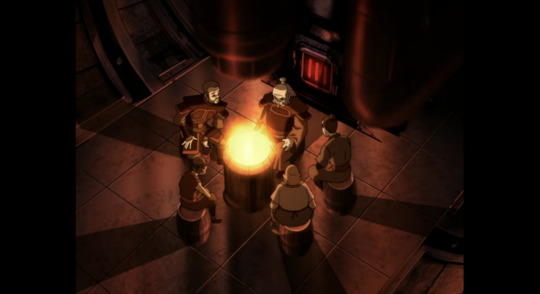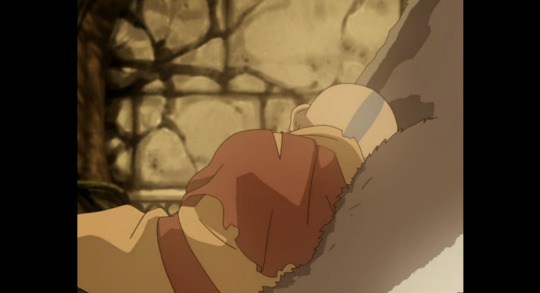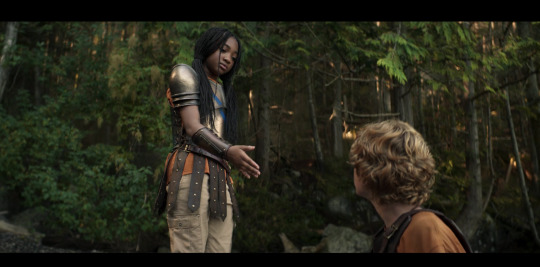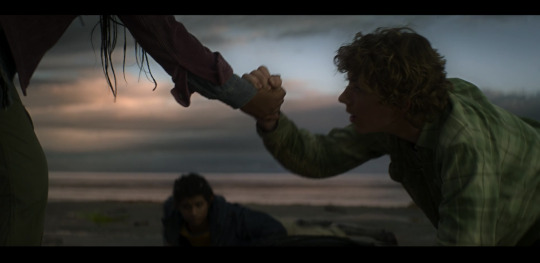#sincerely a very tired nb english major
Explore tagged Tumblr posts
Text
I think the biggest difference for me between projects (like to be clear I think NATLA is not good as an adaptation or a show, and I think the PJO tv show works as an adaptation and a show) is something that feels so basic, but shocked me when it clicked, which is that
NATLA has no actual visual storytelling going on
Which sounds ridiculous, but let me explain what I mean. "Visual storytelling" is how you communicate aspects of character or relationship through visual framing, parallels, that kind of thing, usually to indicate progression or a character's viewpoint. Many people have noticed that NATLA's cinematography leaves much to be desired, there are some shots that are good particularly in episode 6 (the Zuko transition shots between past and present, and one of the ending shots between him and Aang) but that's by and large the exception.
What I mean when I say "visual storytelling" is that NATLA doesn't have visual motifs. It doesn't really have parallels happening that much in the text or in the visuals. And this is something that ATLA did really, really well, all the time, particularly with Zuko's scar. Just take this framing of Zuko and Aang, in particular, from The Storm and The Blue Spirit.




They even have consistent colour tones of Aang having a warmer, lighter yellow (Air Nomad) and Zuko having a darker, deeper red (Fire Nation).
And this is something I think Percy Jackson does pretty well. They have consistent motifs / descriptions if it were, particularly when it comes to Percy and Annabeth's relationship and her character.
Percy: [Choosing Annabeth] And if the mission required someone to push me down a flight of stairs for it to succeed, you want someone who won't hesitate when they do it.
Percy: [literally pushes her down the stairs but to save her life]
Ares: You're new to the family, young one, so let me fill you in on how we work. [...] Olympians fight. We betray. We backstab. We will push anyone down a flight of stairs to get ahead. Annabeth: This isn't the Arch, Seaweed Brain. You're not pushing me into the stairwell aagain. Percy: Yes I am! [...] It's why you're here. When I was choosing my team, I told Chiron I needed someone who wouldn't hesitate to sacrifice me if the quest required it. He agreed. That was you. [...] You're better at this than me. You just are.
Annabeth: [Refusing to get back in Athena's good graces] It isn't how it should be! It isn't. Eat or be eaten [referencing the Kronos story Ares said earlier]. Power and glory and nothing else matters. Ares is that way. Zeus is that way. My mother is that way. He isn't that way. He's better than that. Maybe I was that way once. But I don't wanna be that way anymore. I won't be like all of you. I just won't.
But we also see this visually.




And to be clear I think it's well done, I'm not saying this kind of thing is a Masterpiece™ but what I am saying is that if you do these things, it's a great way to convey information to your audience visually and a sense of progress both in individual characterization and relationship development. And it just makes sense to lean on things visually if you're a visual medium, because prose can't do framing like this to the same degree.
And NATLA just... never does it. There's almost no real parallels, there's very little framing happening, and the even more intense overload of exposition does not help matters in this way either. The original series had a lot of parallels steadily built up (i.e. Aang's presence in the SWT and Sokka's plotline in Jet -- hell, even some of the lines he gets at Roku's Fire Sage temple -- were to show how Sokka was moving away from a more xenophobic worldview even if it was still a work in progress). There were also more overt ones, such as Sokka dressing himself for battle versus Zuko having guards/servants do it for him, but both ultimately tether the two together into having to put on a performance of confidence, manhood, and war more so than being the children they actually are.
And NATLA just has... no real visual parallels. The closest we get is the parallels between Sokka-Yue, Tui and La, and Kataang in the finale, but that's about it.
There's not a lot of scenes where a character is presented the chance to make a similar choice only to then make a different one. Even Aang wanting to go to the NWT to make a difference is muted because he never actually ran away in the first place; when you rip away character flaws or mistakes, you also gut their room for growth. When you strip away visual storytelling, it means that what you see on screen is a 1:1 of exactly what you're getting, and that is just a lot more Boring to watch as well as gutting your chances to show more character exposition. And it's just - it's just not good
#natla critical#natla#pjo tv show#the one that kills me the most is when hahn is like 'you have something the rest of us don't [in fighting the FN]: experience'#and it's like. sokka has not fought zuko or barely any firebenders since the pilot#the only other time his fighting skills got developed was with suki. also at the beginning#he has not done basically anything since then warrior wise. nvm with the fire nation directly#analysis series#analysis#sincerely a very tired nb english major#pjo
76 notes
·
View notes
Text
media literacy (or a lack thereof) has become a buzzword, but what it generally means is "am i taking every part of this text, even the ones i don't personally like and/or am not totally sold on, and willing to engage with it in good faith?" if you have to ignore a plethora of canon scenes with clear, surface level indications of what the takeaway is supposed to be to bend over backwards to validate your take(s), you're probably not engaging in good media literacy. this is not to say that more critical reads of "this thing didn't work for me" or "we should think critically of who made this piece" is moot, those things are worth interrogating. but often at the expense of, and to the extent of, "this canon [insert thing here] was really poorly crafted (because it doesn't align with my particular singular worldview) and therefore no one on the project's alternative viewpoints are worthwhile at all" that so many people seem to take it as.
if you're going to go radically against the text, you have to first have a good understanding of what the text actually is (often times in good faith), and so many people completely and/or wilfully miss that step, tbh
#media literacy#antizutara#also like 2-3 ppl in the tdp fandom#atla fandom problems#if ur main issue with katara is the boy she did or didn't end up with like. im begging u to take a step back#sincerely a very tired nb english major
64 notes
·
View notes
Text
I also think that writing your own books / series (or show, etc) can help develop a further awareness that canon validation or consideration is just... not a pre-requisite for any sort of validity in shipping. Like yes, obviously it's nice when Your Ship becomes Canon and it's also nice to know that avenue was at least a thought in the writers' minds because it "can make you feel less 'crazy'" for reading it that way
But like, when you're doing character construction and building your own OC/OC ships... I can't speak for anyone else, but I considered basically every possibility. What if this character was younger/older and therefore an option, what if this meeting point was different, etc? because you're the one deciding those things. You're deciding who's a technical option
Not only are first drafts usually soo far away from what actually gets on page / on screen even sometimes when it comes to shipping, something being considered — or liked — does not warrant the validity people seem to assign to it. I ship 'fanon' ships in my own works, for characters / couples where I can see the potential or even why someone would, but it's not what I want to do and/or I don't think they'd work out. That doesn't mean they were secretly going to be canon or that they should've been; it just means it was an idea, and an idea that — most importantly — was eventually discarded For A Reason!!
Which is also why I find the fanon ships I like the most are ones where I know with absolute, 100% certainty they were never even thought of (for a variety of valid reasons) never mind remotely intentional, and I'm bringing my own reading to the text. Because for something to be discarded and then considered, I'm gonna want to know (and will probably somewhat agree on a certain level) as to why; it's much more interesting and validating to me to go for something I know was never on the table, and therefore never tossed into the trash
#shipping#dragons rambles#sincerely a very tired english major nb#anti zutara#was specifically thinking about lunter (and some tdp ships) like#no they're not canon. they were/are Never going to be canon. and that's Better to me actually
15 notes
·
View notes
Text
so often the core of tragedy in literature / media is the singularity of it. it’s a unique loneliness, a set of circumstances or choices that couldn’t have happened any other way, an inevitability that robs you of possibility.
it makes me think of the critiques atla faces sometimes, of katara’s one southern tribe elder being painted as a monster / manipulating and abusing her, to a degree. but i think in some ways that’s the point. sometimes imperialism can break a society down so much that elders become warped and hurtful/harmful to the youth. sometimes injustice and trauma means that the support system you’re presented with is so incredibly limited and fractured that you feel as though you have no other options. “no choice.”
jet is similar. he was just starting to rebuild his life when the nation he was fighting to protect killed him. and it’s not as though the gaang doesn’t take violent resistance against the fire nation either in similar ways with prison breaks, rebellions, approving of and disrupting trade routes, commandeering ships, blowing up factories, etc etc. they just do their best to avoid hurting civilians on either side. but jet learns that lesson too late. then he’s a civilian who dies in combat by the hand of an earth kingdom citizen, the same way much of the town he drowned would’ve been.
tragedy is inherent on a singular narrative. there cannot be a reconciliation. there cannot be a second chance. that’s what makes it a tragedy. it may not be your thing, and it may not be what you think was right or the most sensitive for the story outright, but there is merit in it.
#atla#analysis series#ideally all stories are not tragedies tho#variety is key but#yeah how jet & hama were written will never bother me tbh#atla meta#mine#analysis#hama#jet#& if u have a problem with my perspective please block and move on i'm not debating and will just block/delete ur replies lmao#sincerely a very tired nb queer english major
104 notes
·
View notes
Note
My homie please don't tell me you tried to equivalate the real life debate and seriousness bof the don't say gay bill to your anti vs. proship bs
Hi, out queer, ace, and trans person here! I also have an honours degree in the study & history of how fiction can influence reality. Let me take you for a walk (and I'll make sure it's short or else you'll pull the "you think I'm reading all that?") I also already know, thanks to looking at your blog, that you’ve decided I - a sex repulsed, ace adult in a relationship with another adult - am a pedophile, so thanks for bringing back the years of harassment I experienced when I was a literal minor but was unwilling to post my age online bc u know, I was a minor who wanted to keep my privacy a mind-whopping... 2.5 years ago. But clearly I’m decrepit and out of touch now. Never change, tumblr.
A lot of current American politics, including the Don't Say Gay bill (and previously the Hayes Code) was derived from puritanical Victorian era leanings and Calvinistic conservative Christianity. This includes: gayness as an identity > an act (trial of Oscar Wilde), idealization of motherhood, and the moral panic surrounding the 'degradation' of the English language that 18-19th century Grammarians were always concerned with (hi Samuel Johnson).
Another thing grammarians and writers have been concerned with since before is what is Okay to be portrayed in art. Plato's The Republic thinks that art is immoral because it may give people unrealistic or unsafe ideas because people are 'unable' to distinguish fiction from reality. He later retracted this, although Aristotle's Poetics was a text where Aristotle disagreed with Plato's prior established opinion.
Re: the past 3000+ years of literary discourse - those who try to restrict the radical aspects of art lose the argument every time, and start it back up 30 years later.
I'm sure I don't have to tell you that art has always been very political, as is most things. Fandom, as a pop-junkie transformative spiel, has also been deeply political, particularly for marginalized people.
Fandom nowadays is full of people who believe that, in order to be really sorry about something, someone has to publicly repent per whatever moral standard has been decided to else the congregation - I mean twitter - will publicly shame them for their sin.
Fandom is entrenched in cultural Christianity and the conservative mindsets that come with it. Aphobia in fandom was rampant from 2014-2017; truscum and tucute discourse as well; how prevalent TERF rhetoric can be (women are inherently good, attraction to men is shameful, etc). I've seen all of these things in fandom. All hinge an idea on being able to decode a person's intent (somehow), the rising attachment of morality to genres of entertainment (antis), and how many antis I've seen that are TERFs or Aphobes or guzzling down that rhetoric without even realizing.
Terfs and the Conservative far-right have a long history of working together. Both frame concerns of gay people as pedophiles, being anti sex work (because sex is nasty and a sin), that we must Protect the Children who cannot monitor or make any decisions for themselves at any age. The anti vs pro ship dynamic online is a microism of larger public discussions regarding purity culture - and that includes how queerness is overly sexualized, how queer sex is seen as especially dirty, the "should kink be at pride?" discourse, and issues with respectability politics.
Antis who say we have to harass people to control what exists in fandom to "protect minors" on a moral basis are ideologically adjacent to parents who decry earlier Sex Education for children (which, every time it's implemented, is shown to decrease the amount of abuse children face, not further it). A quick scroll through your blog tells me you're willing to generalize hundreds of people's personal history with CSA because you don't think survivors can 1) vehemently disagree with you or 2) demand disclosure of their personal history to exist online void of that harassment.
Aka to take some tags to the forefront: #like the schools don't want to talk about queerness and are banning books so kids don't get Ideas#and people also don't want 'problematic' fiction in fandom in case kids get Ideas or can't use critical thinking skills#it's not a hard leap to make
It sounds like you're the one who has a problem with reading comprehension and building connections between different kinds of discourse, not me. It's almost like teenagers (queer or otherwise) raised in conservative or culturally Christian homes are more susceptible to puritanical rhetoric, or something... 🤔 (I could also get into just how American the current fandom anti vs pro conflict is, but I think this is long enough, don't you?)
A final note from this article:
Beyond betraying simple art illiteracy, though, these intensely personal, emotional complaints and appeals to public safety have a clear antecedent: religious and conservative opposition to “obscenity.” The centering of individual values and pain, the assumption that a universal moral standard exists which should guide all public or quasi-public art and behavior, and the belief that art can do material harm to both people and culture as a whole unite the two at first apparently disparate groups of angry indie gamers and religious fundamentalists.
The deployment of victimhood as an unimpeachable defense is an old tactic frequently used by hate groups like One Million Moms and its parent organization, the American Family Association, whose rallying cry “think of the children” now echoes through everything from intra-community Gay Pride discourse to the drearily predictable “there’s too much sex on TV” tweets that seem to sweep across the platform on a weekly basis.
#anti purity culture#thanks for asking#sincerely a very tired nb queer english major#wasn't as short as i wanted but like#had to approach a certain level of incompetence with a direct read
47 notes
·
View notes